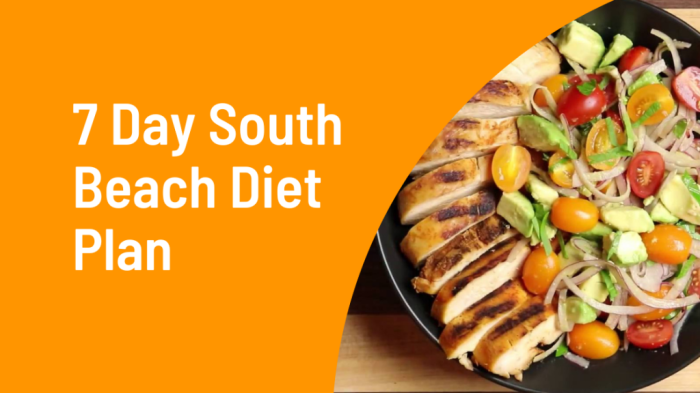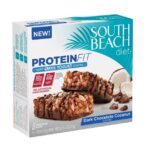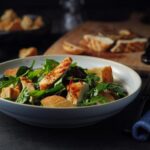South Beach Diet Foods To Avoid: Navigating the South Beach Diet requires a keen understanding of which foods to eliminate for optimal weight loss and health improvements. This isn’t just about cutting calories; it’s about making strategic choices that align with the diet’s core principles. We’ll delve into the specific food groups and items to steer clear of, exploring the science behind why they hinder progress and offering practical alternatives for sustained success.
From hidden sugars lurking in processed foods to the impact of unhealthy fats on your cholesterol, we’ll equip you with the knowledge to make informed decisions and achieve your health goals.
Understanding which foods to avoid on the South Beach Diet is crucial for maximizing its effectiveness. This involves identifying and eliminating high-sugar foods, unhealthy fats, processed items, refined carbohydrates, and sugary drinks. We’ll also cover the importance of portion control and the potential impact of alcohol consumption, providing practical strategies to navigate these challenges. By understanding these dietary restrictions, you can pave the way for successful weight loss and improved overall health.
Sugary Beverages: South Beach Diet Foods To Avoid

Sugary drinks are a significant contributor to excess calorie intake and pose a substantial threat to overall health on the South Beach Diet, or any diet focused on weight management and well-being. These beverages often lack nutritional value, providing empty calories that can hinder weight loss efforts and increase the risk of various health problems. Understanding the types of sugary drinks to avoid and their impact is crucial for successful diet adherence.The Caloric Density of Sugary Drinks and Their Impact on Daily IntakeSugary drinks are incredibly calorie-dense.
A single 12-ounce can of soda can easily contain 150 calories or more, significantly impacting your daily caloric budget. Consider this: consuming two sugary drinks a day adds an extra 300 calories, which is equivalent to a small meal. This surplus can quickly derail weight loss goals, even with a carefully planned diet. The insidious nature of these calories is that they often don’t contribute to feelings of fullness, meaning you may consume more calories overall without feeling satisfied.
Types of Sugary Beverages to Avoid, South Beach Diet Foods To Avoid
It’s important to identify not only the obvious sugary drinks but also those that might sneakily contribute to your sugar intake. Many seemingly innocuous beverages contain surprisingly high levels of added sugars.
- Soda: This includes colas, lemon-lime sodas, and other carbonated sugary drinks. These are notorious for their high sugar content and lack of nutritional value.
- Fruit Juices (Most): While fruits themselves are nutritious, many commercially available fruit juices are heavily processed and contain added sugars. They also lack the fiber found in whole fruits, which helps regulate blood sugar levels. Look for 100% fruit juice with no added sugar.
- Sweetened Teas and Coffees: Lattes, frappuccinos, and sweetened iced teas are often loaded with sugar, syrups, and cream, significantly increasing their calorie count.
- Energy Drinks: These drinks often boast high levels of sugar and caffeine, leading to energy crashes and potential health risks. Their high sugar content also contributes to weight gain and other health issues.
- Sports Drinks (Unless Needed): While beneficial for athletes engaging in intense, prolonged exercise, most individuals do not require the electrolyte content in sports drinks. These often contain high levels of added sugars.
- Flavored Water (Many): Some flavored waters contain added sugars or artificial sweeteners, which can still impact blood sugar levels and overall health. Always check the label.
The Impact of Sugary Beverages on Hydration and Overall Health
While sugary drinks might temporarily quench thirst, they ultimately hinder proper hydration. The high sugar content can actually dehydrate you. Sugar draws water from cells into the bloodstream, leading to a temporary increase in blood volume, followed by increased urination. This process can leave you feeling dehydrated, even though you’ve consumed a liquid. In contrast, water is the best choice for hydration.
Unsweetened tea and coffee can also contribute to daily fluid intake, although caffeine can have a mild diuretic effect.Sugary drinks are strongly linked to a range of health problems, including weight gain, type 2 diabetes, heart disease, and tooth decay. The excessive sugar intake disrupts metabolism, leading to insulin resistance and increased risk of chronic illnesses. Choosing healthier alternatives, such as water, unsweetened tea, or coffee, can significantly improve overall health and support weight management goals.
Portion Control and Overeating

The South Beach Diet, while emphasizing healthy food choices, still necessitates careful attention to portion sizes. Even nutritious foods can contribute to weight gain if consumed in excess. Understanding and implementing effective portion control strategies is crucial for successful weight management and achieving your dietary goals. Overeating, regardless of the food’s nutritional value, disrupts the delicate balance the diet aims to establish.
Successfully navigating the South Beach Diet requires a mindful approach to eating, going beyond simply choosing the right foods. It’s about understanding your body’s hunger and fullness cues and making conscious decisions about how much you consume. This involves actively managing portion sizes, even with healthy options like lean proteins and vegetables. Ignoring portion control can lead to exceeding your daily caloric intake, hindering progress and potentially leading to weight plateaus or even weight gain.
Strategies for Managing Portion Sizes and Preventing Overeating
Several effective strategies can help you manage portion sizes and avoid overeating. By incorporating these techniques into your daily routine, you can cultivate healthier eating habits and maximize the benefits of the South Beach Diet.
- Use Smaller Plates and Bowls: A simple yet highly effective technique is to use smaller plates and bowls. This creates the visual illusion of a larger portion, satisfying your eyes while consuming a smaller quantity of food. For example, switching from a 12-inch dinner plate to a 9-inch plate can significantly reduce your food intake without feeling deprived.
- Mindful Eating: Practice mindful eating by paying close attention to your food as you eat it. Savor each bite, chewing thoroughly and focusing on the taste, texture, and smell. This helps you become more aware of your body’s fullness signals, preventing you from overeating. Put your fork down between bites and avoid distractions like television or your phone.
- Pre-Portion Your Food: Before you begin eating, measure out your portions using measuring cups or a food scale. This ensures you stick to your recommended serving sizes and avoids the temptation to go back for seconds. Pre-portioning your meals and snacks can be particularly helpful for those prone to overeating.
- Eat Slowly: It takes your brain about 20 minutes to register feelings of fullness. Eating slowly allows your body to catch up with your intake, helping you recognize when you’re satisfied and preventing you from consuming more than you need. Putting your utensils down between bites and engaging in conversation during meals can encourage slower eating.
- Listen to Your Body’s Hunger Cues: Pay attention to your body’s signals of hunger and fullness. Don’t eat out of boredom or stress. Instead, eat when you’re truly hungry and stop when you feel comfortably satisfied, not stuffed. Learning to distinguish between true hunger and emotional hunger is crucial for successful portion control.
Mastering the South Beach Diet isn’t about deprivation; it’s about strategic food selection. By understanding and avoiding the foods detailed above—high-sugar items, unhealthy fats, processed foods, refined carbohydrates, and sugary beverages—you’ll significantly improve your chances of success. Remember, portion control and mindful eating are equally important. With consistent effort and a clear understanding of what to avoid, you can unlock the full potential of the South Beach Diet and achieve lasting results.
Your journey to a healthier lifestyle starts with informed choices.

